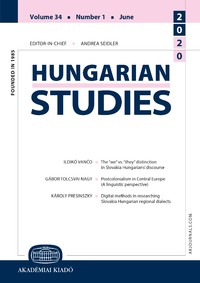The “we” vs. “they” distinction in Slovakia Hungarians' discourse
The “we” vs. “they” distinction in Slovakia Hungarians' discourse
Author(s): Ildikó VančoSubject(s): Language studies
Published by: Akadémiai Kiadó
Keywords: linguistic differentiation; discourse analysis; Slovakia Hungarian variety of language
Summary/Abstract: Linguistic differentiation is a basic component of sociocultural differentiation: social processes create the social and linguistic meanings of variants, sometimes also contributing to language change through discourse processes. In addition to being continuously constructed, discourse is in a dialectic relationship with extra-discursive factors and can therefore be studied only when embedded in its social and linguistic contexts (cf. Fairclough 2010: 3–5, Laihonen 2009). In this article I investigate how the notion of “we” occurs in the metalinguistic discourse of Hungarian speakers in Slovakia (with reference to Slovakia Hungarians and their Hungarian language use) (cf. Kontra 2006) in contrast with the notion of “they” (with reference to Hungary Hungarians and their Hungarian language use) in lay speakers' utterances referring to language. The study reported on in this article uses directed interviews and employs discourse analysis to provide insight into the use of “we” vs. “they” and their meanings in the Slovakia Hungarian variety. It also seeks to show how certain expressions become indexical in conceptualizations of identity and how the distinction of “we” vs. “they” is created by language.
- Issue Year: 34/2020
- Issue No: 1
- Page Range: 73-84
- Page Count: 12
- Language: English
- Content File-PDF

